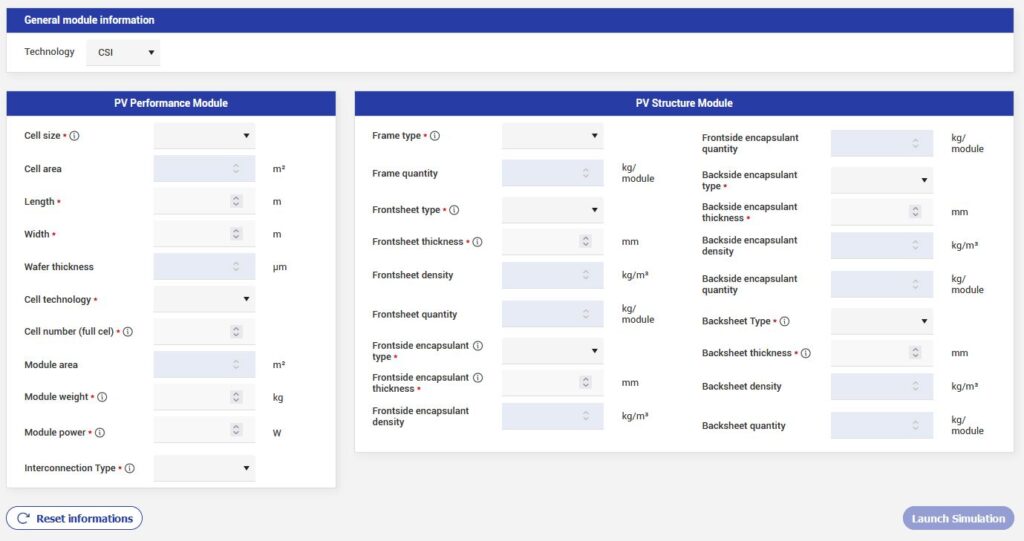Un simulateur pédagogique pour comprendre, évaluer et améliorer la recyclabilité de vos panneaux.
Bienvenue sur ecodesign.solar, une plateforme interactive spécialement conçue pour les acteurs du secteur des panneaux solaires. Développée par SOREN, cette plateforme fournit des informations essentielles sur l’adoption des principes d’éco-conception pour le recyclage dans le cycle de vie des modules photovoltaïques. Grâce à un simulateur éducatif, les utilisateurs peuvent :
- Comprendre la composition des modules photovoltaïquesn of PV modules
- Évaluer la recyclabilité des panneaux en analysant les matériaux et les composants utilisés.
- Améliorer les stratégies de recyclage en explorant différents scénarios et leurs impacts sur les taux de recyclabilité.
UNE MÉTHODE D'ÉVALUATION BASÉE SUR LES CONNAISSANCES OPÉRATIONNELLES DES PROCESSUS DE RECYCLAGE DES ÉQUIPEMENTS EN FIN DE VIE
Cette méthode d’évaluation s’appuie sur les processus de recyclage réels et les connaissances opérationnelles. En exploitant les données détaillées et les connaissances pratiques issues du secteur du recyclage, elle fournit un cadre d’évaluation complet qui comprend :
- Analyse de la composition des matériaux : Évaluer les différents matériaux présents dans les modules photovoltaïques et leur recyclabilité respective.
- Impact environnemental : Évaluer les avantages environnementaux du recyclage par rapport à l'élimination, notamment la réduction des déchets et la conservation des ressources.
- Défis et obstacles : Identifier les éléments qui bloquent ou causent des problèmes dans les opérations de traitement, tels que les matières dangereuses, les composants non recyclables et les structures d'assemblage complexes.
- Développement de l'éco-conception : Découvrez comment ces évaluations peuvent éclairer l'élaboration de plans d'éco-conception, améliorant ainsi la recyclabilité des futurs modules photovoltaïques dès la phase de conception.

Cette méthode garantit une compréhension approfondie du recyclage des modules photovoltaïques, contribuant ainsi à la mise en place de stratégies d’éco-conception efficaces.
Comment utiliser le simulateur ?
L’utilisation du simulateur est simple et intuitive. Suivez ces étapes simples pour commencer :
DONNÉES D'ENTRÉE
Saisissez les informations relatives aux modules photovoltaïques, notamment leur type et leur composition matérielle.

LANCER LA SIMULATION
Permettez au simulateur d’analyser les données et de fournir des résultats détaillés sur les taux de recyclabilité et l’impact environnemental.

LIRE LES RÉSULTATS
Explorez les rapports complets générés par le simulateur, qui comprennent des graphiques, des tableaux et des recommandations pour améliorer la recyclabilité.

IDENTIFIER LES OBSTACLES
Comprenez les éléments qui posent des défis au processus de recyclage et recevez des suggestions pour surmonter ces obstacles.

MISE EN ŒUVRE DES CONNAISSANCES
Appliquez les informations exploitables fournies par le simulateur pour améliorer les stratégies de recyclage et élaborer des plans d’éco-conception qui privilégient la durabilité dès le départ.

Le simulateur est conçu pour être convivial et accessible, ce qui permet de mieux comprendre le recyclage des modules photovoltaïques et de prendre des décisions fondées sur des données. Commencez dès aujourd’hui votre parcours vers une meilleure recyclabilité et une conception durable !
Éco-conception et opérations industrielles
L’intégration des principes d’éco-conception est essentielle pour améliorer la durabilité des opérations industrielles, en particulier dans le secteur du recyclage. Le simulateur joue un rôle central dans le développement de stratégies d’éco-conception et l’optimisation des opérations industrielles de recyclage. Voici comment :
- Décisions éclairées en matière d'écoconception : aperçu de la recyclabilité pour le développement de produits.
- Optimisation des processus de recyclage : relever les défis pour améliorer l'efficacité.
- Promotion des principes de l'économie circulaire : encourager le recyclage en boucle fermée.
- Collaboration et innovation : faciliter les échanges et l'amélioration des pratiques d'éco-conception.
En résumé, le simulateur facilite non seulement l’évaluation de la recyclabilité, mais joue également un rôle crucial dans l’élaboration de stratégies d’éco-conception et l’optimisation des opérations industrielles de recyclage.
En tirant parti des informations fournies par le simulateur, les parties prenantes peuvent œuvrer à un avenir plus durable, où les ressources sont utilisées plus efficacement et où l’impact environnemental est minimisé.


